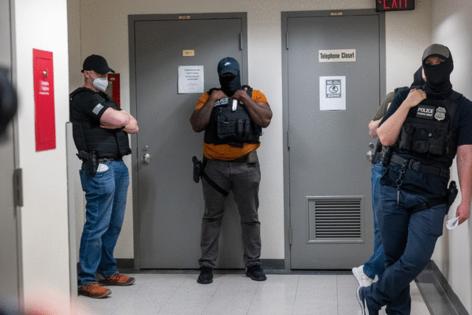Noah Feldman: ICE deportation plans betray a post-Holocaust promise
Published in Op Eds
A new memo outlines plans by Immigration and Customs Enforcement to deport potentially thousands of immigrants to countries that are not their own. The Trump administration’s assiduous efforts to send people to places like Libya and South Sudan are clearly intended to scare noncitizens, both those in the U.S. and those who might contemplate coming.
To understand what’s so bad about these deportations, however, takes more than an intuitive sense that these are dangerous places. You need to go back to the Holocaust, which is the reason we have rules guiding such deportations in the first place.
In the run-up to the Final Solution, Jews fleeing the Nazis were refused entry at the gates of the U.S. Postwar horror at what had happened helped lead to the adoption of the international law principle that refugees cannot be sent back to places where they may be subject to persecution and torture. (The principle is known by its French name, “non-refoulement,” which roughly means “non-return.”) The U.S. laws at issue today in the Trump deportations can be traced to international treaties that the U.S. signed, which, in different ways, give legal force to the non-return principle.
The first international treaty to mention non-refoulement is the Convention Relating to the International Status of Refugees, which dates to 1933, before World War II. Article 3 of the treaty said the signatories wouldn’t return refugees who were “authorised” to reside there regularly, and that they wouldn’t turn back refugees from their borders. Only nine countries agreed to the treaty, and one of them, the UK, didn’t even agree to the second principle.
That set the stage for the Holocaust. Famously, the German liner St. Louis, a passenger ship containing some 900 Jews fleeing the Nazis, was turned away by both Cuba and the U.S. The ship was forced to return to Europe, where the refugees were spread among the governments of the UK, the Netherlands, Belgium, and France. Nearly all of those who went to the UK survived. Most of the others were caught up in the German invasion of the rest of Europe; 254 of them died in the Holocaust.
The St. Louis episode became exemplary of the plight of refugees who were returned to conditions where they might suffer persecution and death. That was part of the context for the 1951 Convention Relating to the Status of Refugees. Article 33 of that treaty — which has nearly 150 signatories — provides that:
No Contracting State shall expel or return (“refouler”) a refugee in any manner whatsoever to the frontiers of territories where his life or freedom would be threatened on account of his race, religion, nationality, membership of a particular social group or political opinion.
The 1951 treaty focused on non-refoulement of refugees from racial and religious hatred, while also adding victims of social and political persecution into the bargain. This reflected the legacy of the Holocaust.
The final step in creating the current international law regime was taken in the 1984 Convention Against Torture, which extended the principle to outlaw sending anyone “to another State where there are substantial grounds for believing that he would be in danger of being subjected to torture.” The U.S. enacted a federal statute that commits it to this obligation.
The technical legal issue in the Trump-era deportation cases is what process is due to people who can lawfully be subject to deportation but, for various reasons, cannot be returned to their home countries or the places from which they entered the U.S. On that issue, the Supreme Court has split 6-3, allowing extremely minimal opportunity for potential deportees to object to being sent to places where they might be tortured.
That issue is highly important. There is also a subsidiary issue, which is itself extremely important, regarding the Trump administration’s repeated willingness to ignore court orders.
These legal questions, significant as they are, shouldn’t distract us from the core moral issue, however: The Trump administration is seeking to undermine promises made by the U.S., not to mention nearly every other country, under the general rubric of “Never again.”
The very threat of deporting people to places where they fear they may encounter torture or persecution violates the spirit of the global commitment to stand against a repetition of the horrors of the Holocaust. That is shameful, whatever legal process the Supreme Court says is due to potential deportees.
_____
This column reflects the personal views of the author and does not necessarily reflect the opinion of the editorial board or Bloomberg LP and its owners.
Noah Feldman is a Bloomberg Opinion columnist. A professor of law at Harvard University, he is author, most recently, of “To Be a Jew Today: A New Guide to God, Israel, and the Jewish People."
_____
©2025 Bloomberg L.P. Visit bloomberg.com/opinion. Distributed by Tribune Content Agency, LLC.

























































Comments